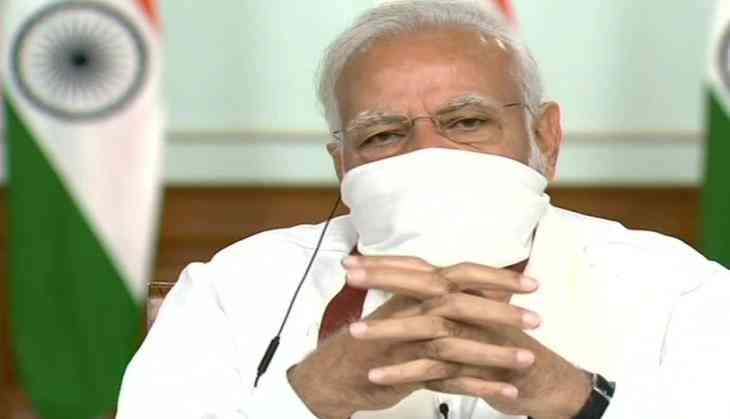
As India battles coronavirus crisis, Prime Minister Narendra Modi on Saturday convened a meeting through a video conference with chief ministers mainly to take their assessment on whether the nationwide lockdown be prolonged beyond 14th April to curb the flow of the infections.
The chief ministers of Punjab, Delhi, Maharashtra and Uttar Pradesh have requested for the lockdown to be extended during a video conference with PM Modi today. The Prime Minister was seen wearing a mask during the video conference as he talked about with the chief ministers the path to follow.
Coronavirus has claimed 239 lives and infected more than 7,400 people in India. The Prime Minister received feedback from the chief ministers on whether the 21-day nationwide lockdown to curb the spread of the Covid-19 would come to an end on Tuesday.
"I am available 24x7. Any chief minister can speak to me and give suggestions (on COVID-19) anytime. We should stand together shoulder-to-shoulder," PM Modi said.
1. "The decision to continue the lockdown should be taken on a national level," Arvind Kejriwal said. "If the states decide the length of the lockdown on their own, then the fight against the coronavirus won't be effective," said the Chief Minister of Delhi, from where the third-highest number of coronavirus infection has been reported, after Tamil Nadu and Maharashtra. "If the lockdown is eased, all kinds of transport, either rail or road, should not be allowed," he said.
2. The Ministry of Health presented a presentation during the meeting. Then one after another the chief ministers had a chat with the Prime Minister. Most of them recommended that the lockdown should be consistently implemented throughout the nation to augment its efficacy, rather than states taking a call on their own.
3. Previous week the Centre stated that people can use homemade, resuable cloth mask as a substitute to retail ones. A set of two pieces would be perfect – one can be washed while the other is in use. PM Modi’s action today was viewed as sending the message across.
4. The state of Punjab and Odisha have earlier announced a prolongation of the lockdown. Odisha CM Naveen Patnaik stated that the virus that emanated from China in late December, "is the biggest threat that the human race has faced in more than a century". "Life will not be the same ever," Mr Patnaik said.
5. The government of Bihar in a letter to the central government has raised no objection to extending the lockdown, but, it wants an exception for rural construction and flood relief work to proceed. The state of Bihar witnessed massive flood in 2019 and reconstructing projects are under way.
6) In his previous video conference with chief ministers on 2nd April, the Prime Minister stated that the centre and states ought to have a common strategy to insure staggered movement of people after the lockdown ends. PM Modi said it "can't be business as usual" after the lockdown and some safeguards would have to be taken, as per a government statement.
7. According to sources the lockdown may be prolonged by with many changes this time. Interstate movement will still be restricted, besides essential services. Religious institutions, schools and colleges are likely to remain closed.
8. Taking into account the massive economic backlash due to the prolonged lockdown, some sector specific relaxation is likely to be authorized, with social distancing rules.
9. Other nations that have tested easing lockdown in a staggered manner have been wary about recurrence of the coronavirus in areas declared free of Sars-CoV-2.
10. China’s Wuhan city, where the virus emanated in December last year, is recovering from coronavirus crisis and loosening tight restrictions on movement and businesses. But comprehensive recovery remains thwarted by fear of a potential new wave of infections. A number of businesses an all schools are still closed, restaurants are not given authorization to dine-in customers, and some neighbourhood remain cordoned.
Also Read: Coronavirus: Labourers' exodus hit medicine supply chain in Delhi
Also Read: Delhi Waqf Board designates graveyard for COVID-19 victims


